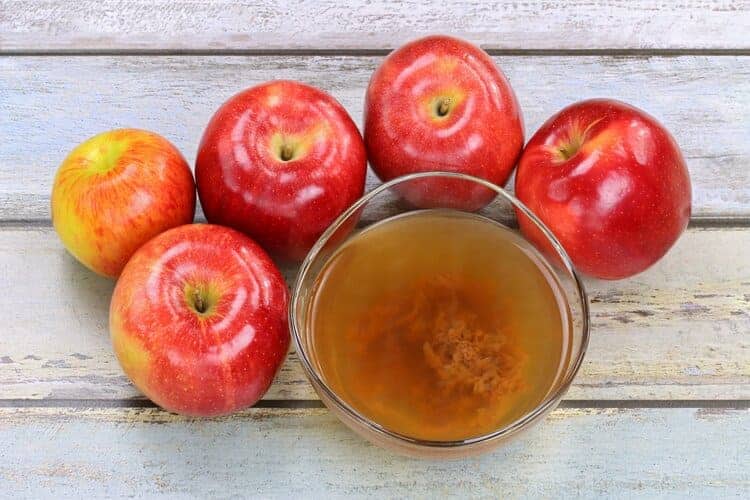
Apple cider vinegar (aka ACV) is one of the most popular – and some would say, most overhyped – natural remedies for various health conditions. So, not surprisingly, there are some who also believe in using apple cider vinegar for PCOS (polycystic ovary syndrome).
Is it wishful thinking or is there some validity to this?
Well, there might be some validity to it. While it’s not a magical cure-all for PCOS, research demonstrates that ACV has the potential to address some imbalances that are critical for PCOS patients.
So, if you’re like to learn more, keep reading!
Note: this post contains affiliate links and I earn a commission (at no additional cost to you) if you use them to make a purchase.
HOW APPLE CIDER VINEGAR MAY HELP PCOS
1. May Improve Insulin Sensitivity
Women with PCOS who struggle with insulin resistance will benefit from improving their insulin sensitivity.
Insulin resistance and insulin sensitivity are essentially two sides of the same coin. If you have insulin resistance, you have low insulin sensitivity, and vice versa.
According to studies, apple cider vinegar may improve insulin sensitivity. Some experts credit acetic acid – a major component of ACV – for this positive effect.
Specifically, ACV supports the body’s response to insulin by:
- Promoting glucose uptake that occurs with muscle performance so that fasting blood glucose levels decrease (source).
- Slowing the process that empties the stomach (to prevent large blood sugar spikes).
- Moving glucose from the bloodstream to your cells.
- Slowing the breakdown of carbohydrate into sugars (source).
One particular study highlighted the positive correlation between ACV and insulin sensitivity. Here are the details of that study:
- The participants were split into three groups: those who were insulin sensitive, insulin resistant, or type 2 diabetic.
- Each participant was instructed to fast and then consume an ACV or placebo drink.
- Two minutes after finishing their drink, they were given a small, high-carbohydrate meal.
- An hour after eating, blood tests revealed that the ACV improved insulin sensitivity in the insulin resistant participants. It also somewhat improved these same markers in type 2 diabetic subjects (source).
Although more research is needed to determine whether ACV could be used as an anti-diabetic treatment, studies like this one show the potential.
2. May Restore Ovarian Function
If you’re a woman with PCOS who wants children, chances are you’re invested in enhancing your fertility and helping promote optimal ovulation.
ACV has shown some promise in this arena too.
However, because research is limited we can’t draw sweeping, generalized conclusions.
Such is the case with the following study which showed very positive results, but had a very small sample size (just seven women):
- After drinking an ACV beverage for 90-110 days, all seven participants showed a decrease in insulin resistance.
- In addition, five women saw a promising decrease in their LH/FSH (luteinizing hormone to follicle stimulating hormone) ratio.
- Furthermore, four of the seven participants had a menstrual cycle with ovulation within 40 days of drinking the ACV beverage (source).
The above outcomes would create a more optimal inner environment for conception. In particular, the decrease in the LH/FSH ratio would help promote normal follicular growth (leading to normal ovulation).
Considering the simplicity of the protocol, these are significant results for women hoping to become pregnant. Now we just need more rigorous studies to confirm these preliminary findings.
3. May Support Weight Loss
The third potential benefit of using apple cider vinegar lies in its ability to promote a healthy weight.
The health food market is full of ACV cleansing drinks promising to help you lose weight, but how does this hold up against the research?
One study evaluated evidence from 487 papers that used both human and animal subjects. Their conclusion?
More long-term, large-scale studies are needed to draw accurate conclusions about apple cider vinegar’s role in weight loss (source).
In addition, some experts suggest that ACV indirectly supports weight loss because it suppresses appetite. Furthermore, it can be used a replacement for high-calorie foods, such as unhealthy store-bought dressings and condiments (source).
HOW (AND WHEN)TO TAKE APPLE CIDER VINEGAR FOR PCOS

1. Diluted ACV Drink
A good place to start is with a basic apple cider vinegar and water mix. One ratio suggestion, based on a three month long study, is one tablespoon of apple cider vinegar combined with seven ounces of pure water, consumed directly after dinner (source).
A word of caution for ACV beverage drinkers: because apple cider vinegar is highly acidic, it can – over time – weaken the enamel on your teeth.
Thankfully, diluting vinegar with water reduces its acidity, but even then, you’ll want to take precautions, especially if you’re drinking ACV routinely.
Here are a few ACV tooth-protecting tips:
- Use a straw.
- Avoid brushing your teeth directly after drinking. (You can cause more damage by brushing softened enamel).
- Rinse your mouth with water after you’ve finished drinking.
- Look at using ACV in capsules (more about that below) if your teeth are already compromised.
When you’re planning to ingest ACV, you want to ensure you’re getting the best, therapeutic quality. This means getting organic, unfiltered and raw apple cider vinegar with “the mother” (a combination of yeast and bacteria that is produced during the fermentation process) (source).
2. ACV Capsules

Perhaps no brand is more associated with apple cider vinegar than Bragg. They’re known for producing high quality, organic vinegar that contains “the mother.”
These capsules contain their signature ACV blend and each serving provides 750mg of acetic acid (plus some vitamin D3 and zinc).
Get Bragg’s ACV capsules here.
3. ACV Gummies
Gummies can be a very convenient and tasty way to supplement ACV.
However, gummies usually contain added, refined sugar, which is not desirable for PCOS or any other condition involving insulin resistance.
That said, if you do decide to use gummies, there are plenty on the market to choose from 🙂
APPLE CIDER VINEGAR FOR PCOS ACNE
You’re not limited to only using apple cider vinegar internally. As someone who struggles with PCOS, you’ll discover that it can also make a wonderful toner for acne-prone skin.
In skincare, toners help remove impurities from the skin’s surface. Furthermore, they often have pH-balancing, astringent and somewhat drying properties that temporarily tighten the skin.
This astringency can also help shrink pimples, reducing their size and severity.
Diluted apple cider vinegar has this kind of action on the skin, making it an helpful natural toner. And, even better, you can easily make it yourself at home.
To make your own apple cider vinegar toner you’ll need:
- 1 part apple cider vinegar
- 2 parts pure water
Or, if you have sensitive skin, you can make a gentler version from:
- 1 part apple cider vinegar
- 3 parts pure water
You can also use this toner as a spot treatment on specific pimples.
When you use ACV as a topical remedy (like a facial toner) it’s important to keep in mind it’s only addressing things at the symptom level. It’s not addressing the underlying cause of PCOS acne.
So, when it’s all said and done, you will still need to address the root cause.
CONCLUSION
Apple cider vinegar holds promise as a natural remedy for insulin resistance and other health issues.
While it’s not an overnight fix for PCOS, it is a healthy condiment that you can consider adding to your diet.
Related Articles:
Inositol For PCOS: Pros, Cons and Food Sources
Hormone Balancing Foods for PCOS: A Complete Guide (with PDF)
What You Should Know About Inositol vs Berberine for PCOS
How to Get Relief from PCOS Symptoms Naturally: 7 Steps to Start Following Today
How to Use Ginger for PCOS: 5 Tips You Probably Don’t Know
The Best Green Tea for PCOS: Benefits | Loose Leaf vs. Matcha | How To Use


